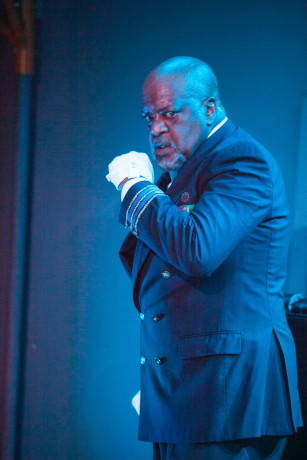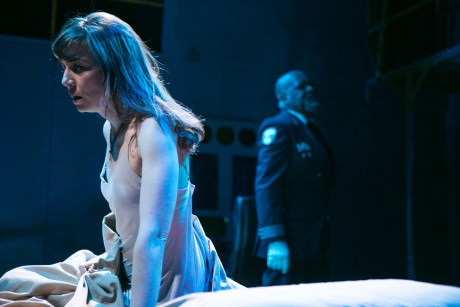T.S. Eliot’s great poem The Hollow Men is sometimes said to be about the shell-shocked soldiers of the First World War. (“We are the hollow men/We are the stuffed men/ Leaning together /Headpiece filled with straw.”) In a time when there are homeless veterans, it is a real service to remind us of the suffering of military men and women as they attempt to adjust to life at home. Director Tom Prewitt, in William Shakespeare’s Othello, provides a stunningly innovative theatrical experience, as he pays a moving tribute to these courageous survivors of trauma.

Prewitt has illuminated the play in a fresh, intriguing way by linking Othello’s anger to PTSD. The wars in the Middle East are evoked by the modern costumes and the setting, which is a submarine, where Iago is being tried for his many crimes. Civilian control of the military is the order of the day; the Duke (Paul McLane) wears a suit, reminding us of the Robert McNamaras and Donald Rumsfelds of the world, who never seem to set foot on the battlefield but who, to paraphrase Rumsfeld “go to war with the army [they] have.” In some scenes, the soldiers laugh and get drunk together, and one is reminded of The Green Zone in Baghdad, where nightly carousing seemed to be a standard ritual, and where ordinary Iraqis were nowhere to be found.
Chuck Young’s Othello is glorious, and he is surrounded by an excellent cast. He is the picture of authority from the beginning, and he inhabits his body with ease and grace. It is hard to believe that he would ever lose his temper, much less kill someone. Yet here, his transformation is understandable; this warrior is under such tight self-control that when his rage comes out it is impossible to contain. He explodes like a volcano, terrifying everyone around him, and sometimes himself as well.
Othello is tender with Desdemona (Sara Barker) at first. He does not suffer fools gladly, but he is capable of great graciousness and style. As the stress of his situation builds, and his PTSD begins to get worse, he clasps his hands in the air, holds his head in anguish, and looks up to the heavens as if asking God to release him from the wasteland his life has become. Sara Barker’s Desdemona is breath-taking, as she desperately clings to the one real thing in her world, her love for Othello. She reminds us why we feel for Desdemona; Desdemona truly is pure love. Did Othello’s sufferings remind her of her own oppressed state, bound to love, serve and obey? Perhaps he had the life experience she could only intuit, the courage she hoped to have if she could have lived life freely on her own. As for Othello, perhaps her innocence reminded him of the childhood he never had. Perhaps Othello’s violent love for Desdemona was his effort to adjust to the civilian world; an effort which failed, with tragic consequences.
As Emilia, Alyssa Sanders’ work is both original and multi-layered. She knows Iago is flawed, yet she loves him; but the flaws are so much greater than she realized, and the truth so much more wounding, that her determined insistence to speak in the end turns her into an almost heroic figure.
As Iago, Frank Britton accomplishes many tasks at once; he is believable as “honest Iago” whom everyone mistakenly trusts; he convinces us that his hatred of the Moor is largely based on jealousy, particularly sexual jealousy; and he drives the play forward with brisk intensity. His Iago is a poster child for the banality of evil.
Jay Hardee’s Roderigo is high-energy and delightfully creative. His scenes with Iago are compelling, and they add a touch of comedy to the proceedings. Brabantio, Desdemona’s father (Manolo Santalla) races around the stage, intoning like an opera star his rage at the loss of his beloved property, or should I say, daughter. His characterization is so strong, and some of his acting so deliberately over the top, that it becomes more obvious than ever why Desdemona might have jumped at the chance to run away with Othello.

Sun King Davis is a strikingly athletic and good-natured Cassio, who cares deeply about Othello and is devastated to discover that he has let his hero down. In his scenes with Bianca (the talented Jennifer Osborn) he has an easy charm that makes her love for him understandable. Osborn, for her part, makes the most of Bianca by playing her with honesty and her own kind of integrity. Joshua Dick as Montano, Paul McLane as Lodovico, and Manolo Santalla as Gratiano each create a distinctive character that adds a key aspect to the production. The Ensemble (Alyssa Sanders, Jennifer Osborn, Manolo Santalla, and Joshua Dick) perform with great versatility and commitment.
Dramaturgs Cam Magee and Emily Ann Gibson deserve special mention for designing the script to adapt beautifully to a contemporary setting. Using one of Iago’s last lines in the beginning was a particularly effective touch. Set and Video Designer Joseph B. Muscumeci, Jr., uses videos very successfully, and his work enhances the dramatic values of the play. Costume Designer Elizabeth Ennis employs an eclectic mix of military uniforms, and modern dress. Emilia is particularly well costumed, in an outfit which seemed to be a compromise between a female soldier and the maid of Desdemona.
Colin Dieck (Lighting Design), Composer Roc Lee and Sound Designer Mehdi Raoufi use music, sound and lighting with great ingenuity to heighten the impact of the production. Properties Designer Kevin Laughon somehow makes the combination of swords and modern military uniforms quite believable, and Choreographer Sandra Holloway and Fight Choreographer Casey Kaleba’s work is first-rate.
Classics about war, such as Erich Maria Remarque’s novel, All Quiet on the Western Front, or, George Packer’s non-fiction book about Iraq, The Assassin’s Gate, remind us of the terrible costs and bitter results of conflict. Though he is morally responsible for what he has done, Othello’s condition was the consequence of his whole life up to that point. Love, even love as pure as Desdemona’s, could not release him from that prison. Hopefully, with the help and support of others, today’s veterans will be more fortunate.
Anne Frank wrote in her diary, “And finally I twist my heart round again, so that the bad is on the outside and the good is on the inside, and keep on trying to find a way of becoming what I would so like to be, and could be, if there weren’t any other people living in the world.”
Othello is Shakespeare at its best; showing us not just what we are but what, in another universe, we might be. Or, as Anne Frank said, “Despite everything, I still believe people are really good at heart.” One can imagine Desdemona saying the same thing.
An outstanding exhibit of work produced by wounded warriors in art therapy is featured in the lobby. WSC Avant Bard has partnered with The 296 Project: Veterans Healing Through Art, to offer this display, with art by Sgt. John Meadows, Kristen Beck, Emma Bennet, and Carolee Jakes.
Information about how you can help today’s veterans is available in the program. Notable options include the Veteran’s Crisis Line, www.veteranscrisisline.net, and www.giveanhour.org, through which mental health professionals provide veterans with complimentary care.
Running time: Two and one-half hours, with one 10-minute intermission.
Othello plays through March 1, 2015 at WSC Avant Bard performing at Theatre on the Run – 3700 South Four Mile Run Drive, in Arlington, VA. For tickets, call the box office at (703) 418-4808, or purchase them online.
RATING:





